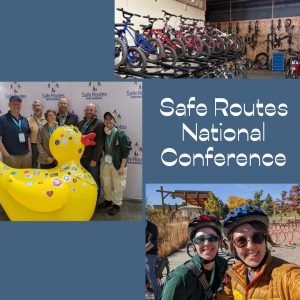 Our team joined over 400 volunteers, educators, and supporters at the 2024 National Safe Routes to School Conference in Fort Collins, Colorado this past October. This was the first in-person event hosted by the Safe Routes Partnership since 2019.
Our team joined over 400 volunteers, educators, and supporters at the 2024 National Safe Routes to School Conference in Fort Collins, Colorado this past October. This was the first in-person event hosted by the Safe Routes Partnership since 2019.
Fort Collins is a Platinum-level Bicycle Friendly Community. This made it possible for the conference team to offer interactive workshops that gave participants the opportunity to easily explore the active transportation infrastructure of Fort Collins.
The dynamic keynote speakers encouraged participants to reflect on the history and current way we work in and with communities. They also highlighted the value of building empathy and compassion through interpersonal relationships in the field and impactful storytelling, which strengthens our work.
We collectively dove into how urban planning and traffic engineering have contributed to a car-dependent society and the role we each have in shaping communities that prioritize safety, inclusivity, and healing. From this, we were inspired to think creatively about active transportation solutions in the communities we serve and the importance of connectivity in the infrastructure and relationships that come from our work.
A significant topic throughout the conference centered on engaging high school students in this work. Specifically, high schoolers are curious about how active transportation aligns with their personal interests, such as mental health. The traditional focus on driving was also discussed, noting that framing the conversation too negatively around driving may not resonate with this age group, as learning to drive is an integral part of their life experience and is seen as an important rite of passage into adulthood.
Another feature at the conference was Traffic gardens, which are safe spaces for youth to learn road rules. These spaces, ranging from small Safety Towns to repurposed parking lots, were presented as effective environments for teaching practical active transportation skills. Communities are increasingly partnering to create traffic gardens to allow students to simulate real-world traffic scenarios that offer an applied learning experience.
In closing, the conference underscored the importance of connectivity in the infrastructure and relationships that come from our collective work. Building cohesive transportation networks requires collaboration, empathy, and innovative solutions to create safe, accessible, and sustainable transportation options for all students. We are enthusiastic about bringing the many examples, conversations, and knowledge gained from the conference into our work to connect communities, schools, and essential community destinations.
